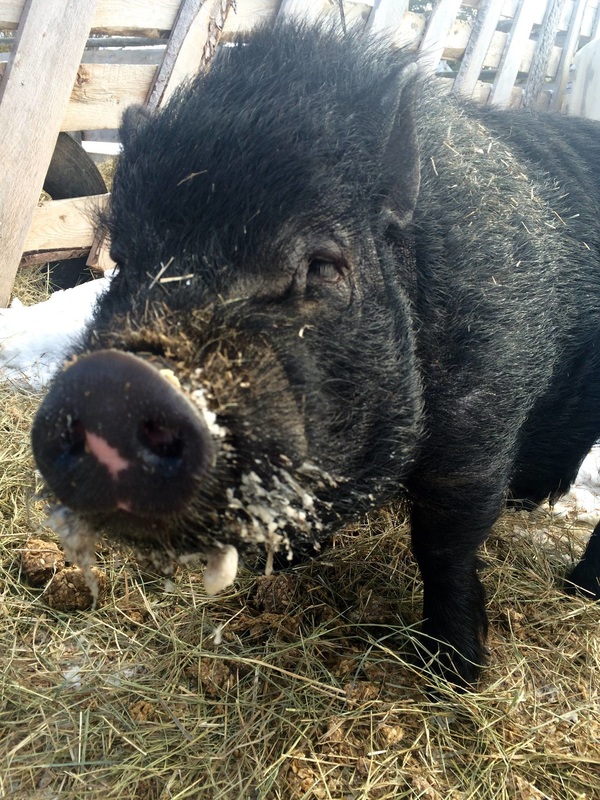There were 5 geese at the beginning of spring. Now there are 26. The geese laid the eggs and hatched them. I collected the babies and put them in a brooder to keep them safe until they were 2 months old, then released them. The gaggle, that is the adult geese, took over and has cared for them and taught them every since. Most of the young geese will be butchered shortly since they are almost at maturity. Hands down, geese are the best and easiest to raise, grow the fastest and mature the fastest. I do love roast goose, but hopefully can sell a dozen frozen after butchering, because that is tooooo many for this farmer.
There were 3 sows and 1 boar at the beginning of spring. The three sows are bred, with Clara, the potbelly due any moment now and the other 3 due in 2 or 3 months from now. From 4 pigs there will be 40 piglets. They will be sold if possible and if not, raised until they are 4 months old, butchered and marketed as Christmas roasters.
There were 40 hens and 7 roosters, until May when there was only 1 rooster left. I counted today and there are at least 40 chicks running around with a few hens still sitting on nests. Unfortunately, the fox got half of the pullets so there may only be about 40 new chickens by the time fall arrives. Most of them will be sent to be butchered for winter food. The flock is self perpetuating.
There were approximately 12 ducks at the beginning of spring and today I counted 34, plus 5 ducks are still sitting on nests. Most of the ducks will be butchered in the fall as well, always keeping the best for breeding the following year. Once in a while I do get a new drake and duck to keep the bloodlines fresh.
There were 3 turkeys at the beginning of spring and today I counted 18. That is a few to sell and one to enjoy every month. Who does not love roast turkey?
The three cows should be bred and produce calves by the fall. The large milk cow will be sold with her calf as a nurse cow and the Galloway and Highland calves, if they are heifers, will stay on the farm as breeding stock, and if steers, will provide grass fed organic beef. One steer would be sold and one would be cut and wrapped. Steak anyone?
The berries did not produce much this year, but there are Haskap (honey berries), Goji berries, goose berries, currants, raspberries and strawberries planted on the farm. Unfortunately the late frost meant a low harvest, and hopefully next year it will be so much better. There are some apples on the trees, though the cherry trees only have a few fruits due to the frost as well. There are two elderberry trees planted for elderflower tonic and wine and elderberry wine. A second plum was platned this year as a pollinator for the other one and next year there should be a bountiful harvest of plums. I have replanted some of the garden due to the chickens eating the seeds even though it is fenced, darn chickens. Many of the green weeds are also harvested for the winter, dried and crushed for tea or greens.
So, although the planning, planting and care of the plants and animals has taken some time and effort, the rewards are at hand. This is what sustainable farming is. For half of the year, the animals are pastured and the ruminants feed themselves, though the birds do get supplemented with grain, but they are foraging for flies, worms and bugs and tasty bits all the time too, and munching on grass and seeds. I even pick weeds and grass for all those in cages twice daily. Oh, I forgot the bunnies. I will shortly breed the Flemish Giant doe and in a month she will produce a litter of 10 kits. I will breed her when they are 2 months old and she will produce another litter, so 20 rabbits will be in the freezer too. There are other does, the Angoras, who first produce fibre. The sheep and some of the goats also produce wool and fibre.
Basically, the Fat Ewe Farm is almost able to be self sustainable, but it does not produce grain for the animals or hay for their winter feed. And of course, some products for the animals, such as medicines and salt and supplements need to be purchased, as well as groceries for the human, though not much in summer at all.
The dream was an organic permaculture rare breeds fibre farm. Amazingly enough, the dream is almost realized. There is still much to do, but if nothing more could be done, I am content to know that I have arrived. What do you say?


 RSS Feed
RSS Feed